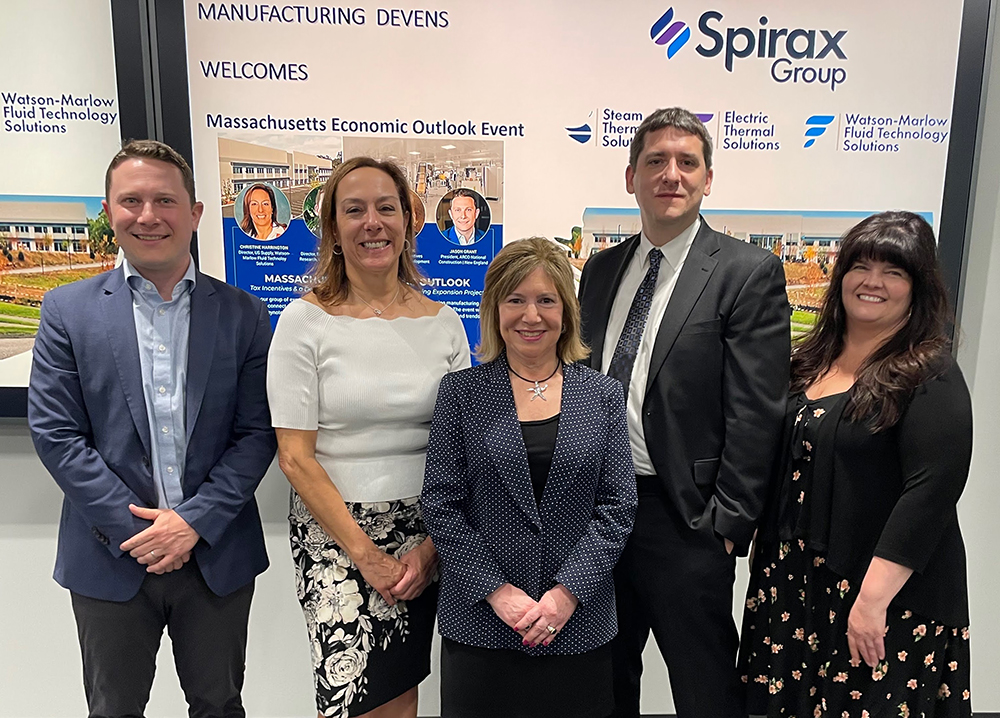Watson-Marlow Fluid Technology Solutions celebrates new 150,000 s/f manufacturing facility in Devens

U.S. supply, Watson-Marlow; Lynn Tokarczyk, president, Business Development Strategies;
Mark Melnick, director, economic & public policy research, UMass Donahue Institute;
Melissa Fetterhoff, president & CEO, Nashoba Valley Chamber of Commerce.
Devens, MA Watson-Marlow Fluid Technology Solutions, a leader in fluid management solutions, showcased its new manufacturing facility by hosting an event where industry leaders explored valuable market insights and strategies. The award-winning 150,000 s/f facility is Watson-Marlow’s first manufacturing location in the United States and is the company’s new North American headquarters. The event featured a panel discussion to explore how tax incentives and a design/build approach resulted in Watson-Marlow deciding to locate this facility in Mass. Watson-Marlow received guidance on leveraging and negotiating tax incentive programs from Business Development Strategies, Inc. (BDS) a leading government tax incentive consulting firm specializing in real estate expansion projects. The facility was built by ARCO National Construction, New England.
The event drew dozens of industry experts and leaders interested in learning how this real estate expansion was made possible and how our region will benefit from added jobs and economic activity. The forum was highlighted by a presentation of the Massachusetts Economic Outlook by Mark Melnick, director of economic and public policy research at the UMass Donahue Institute. The discussion was moderated by Jason Grant, president of ARCO National Construction, New England. Joining Grant and Melnick on the panel were Christine Harrington, director of U.S. supply at Watson-Marlow Fluid Technology Solutions and government tax incentives specialist, Lynn Tokarczyk, president of BDS. The experts engaged in a spirited and informative discussion about the current state of the Massachusetts economy and what advantages the state holds for companies looking to expand their real estate footprint.
The Watson-Marlow expansion in Devens was dissected in detail and praised as a significant win for Massachusetts and the region’s economy, and instructive for other municipalities on how to they can attract new businesses.
“We find that the communities that have very strong marketing campaigns, making it clear they are open for business and willing to go the extra-mile to make real estate expansions possible, are the cities and towns winning these projects,” said Tokarczyk. “Communities such as Devens are willing to engage because they recognize the value of new tax revenue and jobs. We are finding now that tax incentives are important more than ever as companies are making corporate real estate decisions, and tax incentives should be secured before companies sign a lease or close on property.” Otherwise, they could leave cash on the table.
“Partnering with Lynn and Business Development Strategies on getting the tax incentives was huge in our decision-making process to build this facility in Devens,” said Harrington. “Massachusetts has goals on sustainability match-up perfectly with what we are trying to do at Watson-Marlow. This is a LEED Gold Certified facility, and we are installing solar array covering the entire roof. The Devens Enterprise Commission worked with us on the utility rules and guidelines, making it possible for us to install these solar arrays. When completed, the solar arrays will provide 70% of our power supply throughout this facility at peak times.”
The event at Watson-Marlow was attended by dozens of industry leaders and government and economic development officials interested in learning how tax incentives and a design-build approach can result in more Massachusetts municipalities attracting lucrative manufacturing expansion projects that create jobs, increase tax revenues, and stimulates more economic growth.
Mount Vernon Co. acquires John Carver Inn & Spa in Plymouth, MA


Recently passed legislation creates opportunities to meet CT’s changing energy needs - by Klein and Feinn

IREM President’s Message: Fostering community connections during the holiday season


.png)





.png)
